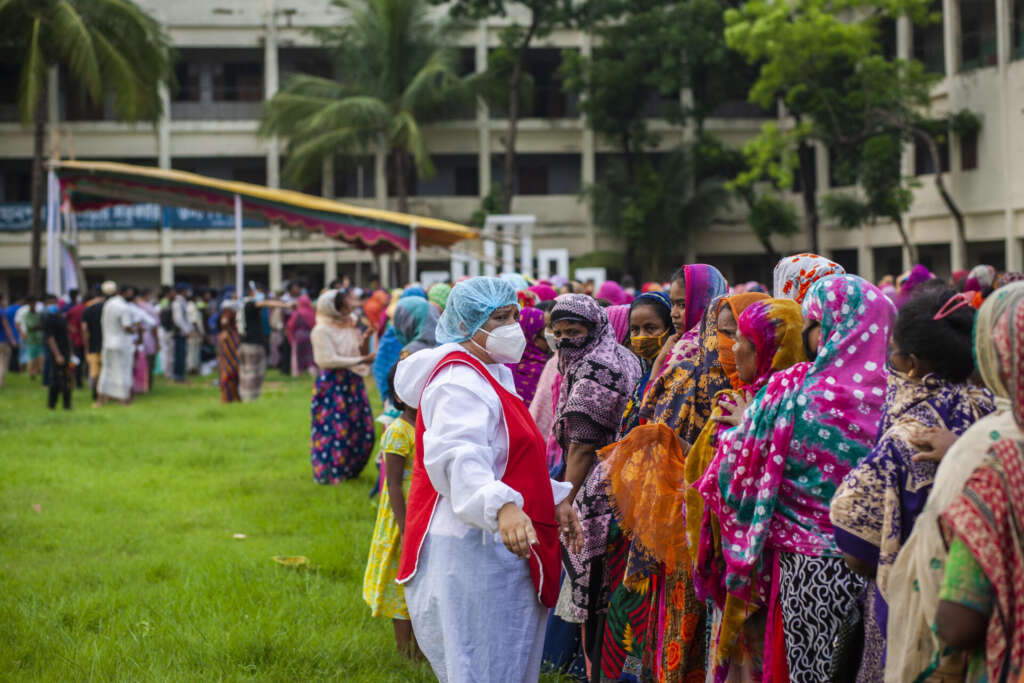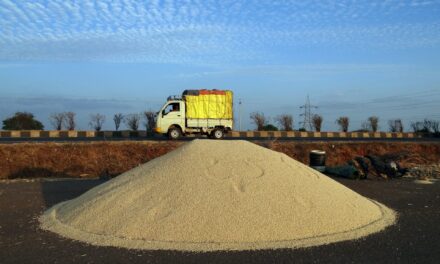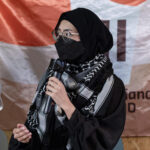
Sultana Jannat Shikha, 35, works as a senior volunteer at Bidyanando Foundation. She has two sons, and her husband works at a multinational company. She has been working in the frontline ever since the Covid-19 outbreak. Photo: UN Women/Fahad Abdullah Kaizer
The COVID-19 pandemic manifested in a world racked with accelerating climate change, recurring financial crises, deepening economic fragility, continuing armed conflicts and shrinking democratic space. These are systemic crises and they are gendered. Strategies and pathways to adequately address these crises must also be gendered in both, vision and practical measures.
The pandemic laid bare the central role of capitalism and neoliberalism in creating conditions that perpetuate inequality, injustice, violence and suffering. Class, social privilege, race/ethnicity, caste, gender and occupation determined who were most vulnerable to, and suffered the worst impacts of the pandemic, including both infection, as well as governmental responses to tackle the pandemic. As news emerged about infections, arrests, deaths, hunger and destitution on the one hand, and about the wealth accumulated by COVID millionaires/billionaire on the other hand, the ugly, brutal reality of social, economic and political inequality could not be ignored.
In Asia, decades of neoliberalism have resulted in official neglect of public health, education, food, energy, transportation and social protection systems necessary for building strong, resilient and humane societies. Privatisation has put essential goods and services out of reach of millions of families. Financial, environmental, agricultural and labour policies and regulations have favoured corporations, large businesses and wealthy elites over small entrepreneurs, workers, small scale food producers, and low-income and poor populations. Extractivism, industrial agriculture and unbridled property development have escalated greenhouse gas (GHG) emissions, eco-system destruction, environmental pollution, land degradation and the dispossession of rural and urban peoples. It is no secret that women and girls have borne a disproportionate share of the impacts, stresses and risks arising from these trends.
The pandemic provided many Asian governments with the perfect opportunity to cement authoritarian rule, control public discourse and erode human rights. Emergency powers invoked by governments—ostensibly to control the pandemic—gave them full control over all aspects of governance and security, bypassing democratic oversight. Under the pretext of preventing disinformation and maintaining social stability, public surveillance was stepped up, press and media were muzzled, freedom of speech, movement, and assembly were restricted, and due processes of justice were suspended. Those who questioned government measures and actions were persecuted on the grounds that they were spreading fake news, and creating panic and unrest. In some countries, curfews and lockdowns were violently enforced and pandemic containment was militarised. Here again we see that women faced additional hardships since emergency measures did not include succour for poor and working class families. Big businesses however, received official bail-outs, tax privileges and investment incentives.
Dangerous dynamics
Patriarchy continues to be the central structural force in gender discrimination and oppression, but it does not operate in isolation of other economic and political forces. The intersection of patriarchy, neoliberalism and capitalism produce complex, potent and often concealed forms of exploitation and subjugation. Studies conducted since the 1990-s have pointed to the impacts of privatisation, financialization, financial crises, free trade-investment agreements and debt on women and girls, indicating the importance of structural economic, institutional and political measures in building women’s empowerment, agency and citizenship.
Detecting gender discrimination at family levels is far easier than detecting it in labour and environmental regulations, agricultural policies, health, education and social protection programmes, and tax structures. Lack of relevant, quality formal education pushes women to work in less skilled, lower paid and more dispensable jobs, making their needs and rights invisible in policy making. Combined with household care responsibilities, many women work more in the informal sector (including domestic and home-based subcontracted work), or if possible, are self-employed (often selling home-produced goods). Their contributions to household economic and social security, although significant, tend to be less visible than of men and are not fully included in the national accounting.
In rural areas, women are often not recognised as farmers or fishers by governments, although they constitute more than 50 % of the agrarian work force and do at least as much productive work as men. Consequently they do not have equal access to land, equipment, credit and extension services, and their needs do not shape agricultural policies. Women are almost universally the target of nutrition programmes, but rarely have a voice in shaping food and nutrition policies. Gender inequalities are aggravated by environmental and climate related disasters. Land and water grabbing greatly increasing women’s workload and exposure to hazardous conditions, especially in areas where they rely directly on the natural environment for food, water, fuel wood, medicines and income. However, women’s realities and demands are not reflected in environmental regulations, nor in land and water governance policies.
The pandemic has revealed clearly how existing inequalities result in differential impacts, that in the absence of structural, systemic corrections, inequality, discrimination and injustice will continue to be reproduced and entrenched. Women are responsible for productive and social reproductive work, which includes caring for the family and household, as well as maintaining the social fabric. Crisis conditions multiply the burden of care, the stress to find new means of income, and vulnerability to domestic violence while reinforcing traditional gender roles and discrimination.
Research shows that because of the pandemic, millions of workers globally in temporary, part-time or self-employment, and/or in the informal economy, lost jobs and livelihoods with no income protection measures, the majority of whom were women. In Southeast Asia, women and youth bore the brunt of job losses. Many more women than men work in sectors that were hardest hit by the crisis, including hotel and food services, wholesale and retail trade, arts and entertainment, business services and labour-intensive manufacturing, and thus experienced severe job losses. Across Asia-Pacific, women make up more than 70 per cent of workers in frontline jobs deemed essential, for example, in health care and social services, putting them at the greatest risk of exposure to the virus. However, majority are at lower rungs of the workforce and did not get the protective and support measures to do these jobs, nor even access to adequate health services.
The pandemic has highlighted the importance of care work. Care includes all activities required for the reproduction, well-being and welfare of families, communities and societies, and takes place across both formal and informal economies. Care is the enabler of economic systems and essential for all productive work. Even before the pandemic, women provided about three quarters of unpaid care work. Disruptions in employment, livelihoods, schools, childcare and health services because of the pandemic increased the burden of care work on women’s shoulders.
What would a Feminist Post Pandemic Recovery look like?
The past two years have shown clearly that post pandemic recovery must not follow business-as-usual blueprints that include favourable conditions for corporate private investment, opening up new territories for resource extraction and mega infrastructure projects, reducing environmental and labour protections even further, prioritising export-led trade and global value chains, and allowing financial markets to continue to dominate the real economy.
Gender equality and equity will not be achieved by adding ‘women and girls’ components to policies and programmes that perpetuate and reproduce inequalities, exploitation and injustice. If corporate power abuses, labour rights violations, unsafe working conditions, territorial destruction, land, water and resource grabbing, and environmental pollution are not significantly addressed, increasing women’s employment in poorly paid, unprotected, unsafe, exploitative jobs, or enrolling them in rural income generation and employment schemes will not result in reducing gender inequality, or liberating women from oppression.
Instead, we need to seize the opportunities that the present conjuncture offers to aggressively push for radical transformation of economic, social, political and governance systems that strengthen the voice, agency and capacities for self-determination of women and girls, moving beyond binary gender identities. This calls for:
- Dismantling of systems and structures that enable exploitation, discrimination, oppression, destruction, injustice and violence.
- Building equal, non-exploitative relations among peoples so that they have equal means to build their potential, work and live with dignity and participate meaningfully in governance.
- Respecting nature and nature’s value in regenerating life and resisting the human obsession to control nature for capital accumulation.
A feminist approach to post pandemic recovery would prioritize the building of public economies that are just, genuinely sustainable and territorially embedded, invigorate local-national economic capacities and re-build the real economy, and are democratically governed. It demands governments to step up to their responsibilities as duty bearers and place social protection, human rights, public participation and justice at the center of all public policies. This would entail regulations, laws, policies and resource allocation that uphold public interest rather than corporate interest; functioning justice systems at multiple levels; reversal of privatization; and increased public investment in goods, services and systems that are essential to women and girls, especially care and social protection. Social protection measures must advance the realisation of human rights, and be designed according to the different needs and realities of rural and urban communities, workers, small scale food producers, indigenous peoples and among these, women and girls. In the words of Olivier De Schutter, UN Special Rapporteur on Extreme Poverty and Human Rights:
This means defining social protection neither as an emergency response to a situation of crisis, nor as charity – but rather as a set of permanent entitlements prescribed by domestic legislation, defining individuals as rights-holders, and guaranteeing them access to independent claims mechanisms if they are denied the benefits for which they qualify. Both the mobilization of domestic resources and international solidarity should be placed in the service of this objective (Special Rapporteur on extreme poverty and human rights report on Rights based approach to Social Protection in post pandemic recovery; 11 September 2020, page 2)
Trade and investment agreements must serve local-national needs rather than corporate profits, and investor-state dispute settlement provisions be removed completely from these agreements. Corporate efforts to control technologies, goods and services essential for public interest and welfare through intellectual property rights would have no place in trade-investment policies and agreements. Progressive taxation is crucial, and must be accompanied by redistribution structures that ensure that indirect taxes do not perpetuate the existing, unequal financial system. Cash transfers will not help if public services are not of quality enough to keep apace with the rising costs of living.
It is essential to strengthen local-national food systems through food sovereignty, agroecology, rights to land, agrarian reform, cooperatives, territorial markets, public procurement and fair prices, and public support for small-scale entrepreneurs. Protecting the rights of small-scale food producers and indigenous communities to save and share seeds and breeds, and to govern their territories are important to strengthen self-determination in food systems. Nature, land, water, food and seeds are feminist issues. Rural women across Asia depend on the natural environment for food, livelihoods and income: they work the land, they save seeds, they are living libraries of knowledge about local eco-systems; they build and sustain territorial food systems. The central roles of women in food provision must be recognised and supported through targeted practical measures.
A strong public economy cannot be built without ensuring the rights of workers in the formal and informal sectors to decent work, safe working conditions, living wages, and freedom of association and collective action. Migrant workers are more vulnerable to exploitation and their situations need special attention. Women must have equal pay for equal work, and be assured protection from sexual and gender based harassment. One of the biggest triggers of outward migration is family indebtedness, trapping young women in poorly paid and often unsafe and exploitative work conditions. Unconditional debt cancellation and targeted economic support are essential to rebuild agrarian economic capacities.
Post pandemic recovery must embody climate and environmental justice, which include halting the destruction of forests, eco-systems and biodiversity; phasing out fossil fuels and industrial agriculture; directing public investment towards renewable energies; and sufficient, non-debt creating finance for mitigation, adaptation and loss and damage. False solutions such as Net Zero, Green and Blue Economies, Carbon Capture and Storage need to be discarded.
A crucial accompaniment to building a democratic, public economy is dismantling the power of corporations over the economy, governance, nature, food systems and all productive sectors. Corporations must be legally compelled to pay their dues, respect the rights of people and be legally and materially accountable for harm. Equally important is regulating finance and rolling back financialisation, which allows corporations to increase control over the real economy–products, services, jobs, regulation, policies, etc. Corporations are the biggest beneficiaries of financialization: they have the financial/organizational capacities to make profits, survive risks and get bail-outs. They are able to dominate the development and use of proprietary technologies in agriculture, medical sciences, artificial intelligence, payment gateways, virtual marketplaces, etc., as well as determine conditions of access to these technologies. Financialisation and regulatory failure have generated frequent and ruinous financial crises, which have morphed into broad economic crises, repeatedly wearing down the public goods, services and systems that women depend on.
Building democratic public economies demand the restoration of participatory democracy, uncompromising legal protection of human and community rights, and an end to conflict, wars and occupations. There is no place for authoritarianism, fascism, bigotry and territorial aggression in a feminist approach to post-pandemic recovery and transformation.
—
Selected References:
Beyond COVID-19: A Feminist Plan for Sustainability and Social Justice. https://www.unwomen.org/sites/default/files/Headquarters/Attachments/Sections/Library/Publications/2021/Feminist-plan-for-sustainability-and-social-justice-en.pdf. Accessed 26 February 2022.
Financialisation at Heart of Economic Malaise. https://www.ksjomo.org/post/financialization-at-heart-of-economic-malaise. Accessed 28 February 2022.
ILO Monitor: COVID-19 and the World of Work. Sixth Edition. https://www.ilo.org/wcmsp5/groups/public/—dgreports/—dcomm/documents/briefingnote/wcms_755910.pdf. Accessed 24 February 2022.
ILO Monitor: COVID-19 and the World of Work. Fifth Edition. https://www.ilo.org/global/topics/coronavirus/impacts-and-responses/WCMS_749399/lang–en/index.htm. Accessed 24 February 2022.
Looking back to look ahead: A rights-based approach to social protection in the post-COVID-19 economic recovery. https://www.ohchr.org/Documents/Issues/Poverty/covid19.pdf. Accessed 27 February 2022.
Rising to the Challenge. The case for permanent progressive policies to tackle Asia’s coronavirus and inequality crisis. https://oxfamilibrary.openrepository.com/bitstream/handle/10546/621343/bp-rising-challenge-asia-coronavirus-inequality-120122-en.pdf;jsessionid=FA8432875CE7D0E362E89AFF27121ED9?sequence=1. Accessed 25 February 2022.








